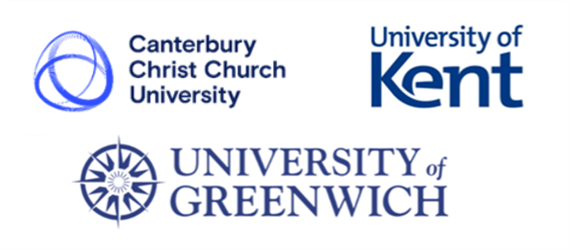
Universities at Medway Learning and Teaching Conference 2024
26th June 2024
About the conference
The annual Medway Learning and Teaching conference is jointly organised by the Universities of Kent, Canterbury Christ Church and Greenwich, who share the Medway campus. The conference aims to share, celebrate, and promote best practice across the Medway campus.
This year the conference will be held on Wednesday 26th June 2024 on the Medway campus. It is free and welcomes all staff and students from the three universities and their partner institutions, and local education providers to attend in-person. Presenters who cannot come to the campus on the day will be supported to present online and all sessions will be recorded. If you register to attend the conference, then you will have access to the recordings. Free refreshments and a light lunch will be provided on the day.
The Keynote Speaker: Dr Martin Compton
Keynote Theme:
“AI3: Crossing the beams of artificial intelligence, academic integrity and assessment innovation”.
About Martin

Martin is College Lead for AI and Innovation in Education and Programme, Module & Assessment Design Lead at King’s College London.
He has been an educator for over 30 years, affording him ample time to realise that it takes a lifetime of teaching to get the hang of it. In that time, he has had the privilege of teaching children, young people and adults. His teaching has spanned secondary schools, international schools, further education colleges and universities both in the UK and overseas. Having spent a number of years at the University of Greenwich and then UCL, in July 2023 he took up a post at King's College London where he was employed to lead on curriculum and assessment design but as it turned out he has spent most of his time looking at ways in which the opportunities and threats of AI will necessitate changes to pedagogy, assessment and feedback practices across higher education. His role as College Lead for AI in Education gives him the opportunity to help colleagues reflect on, critique and reimagine teaching and assessment design and other ways of elevating a 'freedom to learn' philosophy.
Details of his keynote are below:
AI3: Crossing the beams of artificial intelligence, academic integrity and assessment innovation
The keynote slides are in the 'Downloads' section on the top right of this page.
A link to his blog post can be found here: AI3: Crossing the beams of artificial intelligence, academic integrity and assessment innovation
A CCCU Spotlight on Best Practice podcast featuring Martin can be found here: AI in Education - Assessment Innovation to combat misuse of generative AI
'Artificial intelligence appears to permeate every conversation in HE and it's easy to forget that it is a phenomenon not designed solely to make the lives of those of us working in HE harder. Reflecting increasing polarisation in the wider World, its present and future effects have been divisive. With so much uncertainty and so many competing narratives and immediate and pressing anxieties, how might we tackle the implications of these incredibly disruptive and rapidly evolving technologies?
In this keynote, Martin considers three increasingly intertwined AIs: artificial intelligence; academic integrity; and what now seems urgent: assessment innovation. Amidst a cacophony of predictions ranging from the utopian to the dystopian, Martin argues for a reflective approach to our assessment practices. Is the detection of AI usage the most effective strategy, or is it time to radically rethink our approaches to assessment itself? This presentation will not only navigate the uncharted territories of technological impact but will also challenge us to reconsider the very purpose of assessment in education. Join Martin as he risks crossing the three AI beams and offers reflections, provocations and insights into how we might imagine and then realise a different assessment future.'
Conference Theme
Courage, Compassion & Trust: Helping students see the value of Higher Education
These are challenging times and Higher Education (HE) is feeling the pressure. We need to show that HE provision is still valid, current and an excellent way to build skills and knowledge for a productive and successful future. Two genuinely unique contributions that HE brings to education are, one, a 'way of thinking' , which broadly defined - it trains you to think and be a certain way in the world (variously packaged as critical thinking/ reflexive thinking/ independent learning/ lifelong learning, depending on context and emphasis). Two, It offers access to expertise from a range of disciplines and promotes an understanding of the interconnectedness and relativity of knowledge, which in itself promotes compassion. Our theme calls for ideas and inspirations for shaping minds, shaping communities, and critical thinking for compassion and empathy. Your proposals might cover any of the following:
-
Building communities of learning beyond the university. This might be your experience of expanding outreach to local colleges and sixth forms. Ways in which you can inspire young people to study beyond school. How to do this differently/more effectively, considering the underfunding of FE colleges nationally, but particularly locally.
-
Finding new and courageous approaches to areas such as academic integrity. Advocate for an educative rather than a punitive approach and showcase what good academic practice is and why we should aspire to it. Avoid visiting epistemic injustice on our staff and students.
-
Avoiding moral panic around Generative AI. AI has the power to aid higher education and employers are increasingly going to expect graduates to be comfortable and trained to use AI efficiently and ethically. Take the focus away from fears of students cheating and more on how it can be used for educational development.
-
Challenging the 'bare minimum' narrative. Inspiring students through challenging curriculum to think beyond their subject boundaries - teaching using growth mindset techniques.
-
Active use of learning development to promote compassion within the University. E.g., challenging 'they should already know that' attitudes to (particularly) assessment literacy e.g., being able to write an essay. This is where generative AI could be used in a helpful way, as many second-career academics don't have these writing/ research skills themselves, or the time/support to develop them.
-
Actively building knowledge networks with cohorts. Teaching with methodologies that promote social cohesion, and providing the space and timetabled hours to do so. Building a strong argument for reducing 'independent learning time' in modules, which students read as 'time to go and do the housework/pick up the kids/earn' and facilitating them being on campus, working together, facilitated by tutors. This might be through a collaborative approach with lecturers, learning development teams, library staff, and student support forming integrated teaching teams to learn how to learn together.
-
Making space in PSRB curriculums for humanities-based approaches to science education, e.g., interdisciplinarity in health-care, education, nursing, humanities, social sciences, etc.
-
Advocate for how critical thinking skills promote empathy and compassion e.g., through the normalisation of multiple perspectives (this is usually achieved through clinical supervision in nursing), but alternative approaches such as literature based approaches would be a really exciting and novel way to explore increasing reflection and empathy in clinical trainees).
Other ideas relating to the theme are welcome.
Recordings/Slides from the Conference
Row showing conference programme
| Parallel Sessions 1 - 9.45 - 10.45 | |
|---|
| David Bedford |
Critical thinking BREAD and butter - a thinking tool fit for the age of AI |
| Katie Dray |
Building Learning Community through Multi-Cohort Practical Sessions: A Case Study from Sport Coaching |
| Celso Lopez |
Panel Discussion: Peer Mentoring: Unveiling Higher Education's Hidden Jewel |
| Hiu Fung Jimmy Lo |
[SLIDES ONLY] Adapting to AI and the Future of Work: Rethinking University Education and Preparing Students for the AI-driven Workplace |
| Melanie Thorley, Serena Christie |
[SLIDES ONLY] Preparing disabled students for university: STAART sustained support |
| Giulia Getti, Karim Mahmoud |
[SLIDES ONLY] Panel Discussion: Fostering engagement through student-led approaches to facilitate lifelong learning: the case study of BioMed Online Learning |
| Parallel Sessions 2 - 11.00 - 12.00 |
|
| Michael Okereke |
Fostering Learning beyond university: A Case study of a STEM academic's Journey on YouTube and LinkedIn |
| Sallyanne Decker, Stuart Sims, Rachel George, Maria Mateo Recao, Lianfeng Quan, Robert Willson |
Students’ perspectives on participating in shared modules: Benefits and Challenges |
| Stuart Smith |
[TBC] AI as a Constant Companion |
| Nicole Holt |
Action Research: ‘Co-Working and Writing’ Supporting and creating writing spaces for Undergraduate Health students |
| Ade Magaji, Michael Adjani |
Co-constructing knowledge between educators and their students - a pedagogical approach to teaching and learning in the HE. |
| Ahmed Elamin, Panos Kloukinas |
[TBC] An insight at peer assessment of group work in civil engineering |
| Ade Magaji, Samuel Coombes, Lorraine Smith |
Pedagogical approaches to inclusive education and decolonising the curriculum as both sides of the spectrum: what does it entail for us as educators? |
| Parallel Sessions 3 - 13.35 - 14.35 |
|
| Laura Hackett |
[SLIDES ONLY] Designing a 'Climate Escape Room' to teach university staff and students about climate science |
| Richard Harrison, Anna Vines, Rianna Lin |
Perceptions of Students’ Mathematical Development in Undergraduate STEM Subjects from the Perspectives of Students and Lecturers |
| Gemma van Vuuren Cassar |
Assessment Feedback: student and staff views on written and audio feedback |
| Nicole Holt |
TikTok as Educational Tool for Health Students |
| Renginee Pillay, Darine Haidar, Susheelwant Singh, Patricia Dubin |
Law Students as Change Agents and Co-Producers of Knowledge in Decolonising the (Legal) Curriculum |
| Giulia Getti |
Feedback, the ‘how’ and ‘when’ of a successful feedback strategy |
| Emma Kennedy, Hiu Fung Jimmy Lo, Naima Purnima, Sumaiya Taher |
[SLIDES ONLY] Student and staff perceptions of generative AI: its uses, abuses and futures in higher education |
| For Keynote slides, podcast and blog, please further up this page (recording of Keynote unavailable). |
|
Further Information
General enquiries: LTE-ADMIN@canterbury.ac.uk
Privacy Notice
When you register for the conference, we process information about who you are and your contact details; information that you provide on adjustments that may need to be made to enable you to attend and your dietary requirements. This information will be used by relevant employees at the Universities of Kent, Canterbury Christ Church and Greenwich to manage your attendance and participation at the Medway Learning & Teaching Conference 2024 and enable you to provide your feedback afterwards. The data that you provide will be held by the Canterbury Christ Church University for a period of 5 years and will not be shared with third parties. Further information about the Canterbury Christ Church University’s approach to data protection and to your rights can be found here.